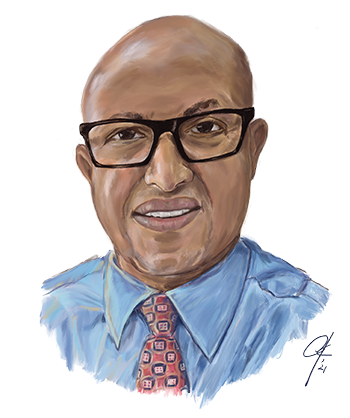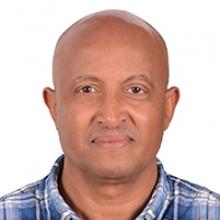Meet the Expert: Mehari Belachew

Mehari Belachew leads large and medium-scale surveys on social, demographic, and economic topics for Kimetrica (an affiliate of AIR). Mehari, who is based in Ethiopia, manages these projects from survey design through quality assurance. Prior to joining Kimetrica, he worked for the Central Statistical Agency of Ethiopia (CSA), where he helped lead the 2007 National Population and Housing Survey for the census.
Position: Head of Survey Services, Kimetrica
Areas of Expertise: Statistics, demography
Years of Experience: 25+
Q. The size of the surveys you work on are major undertakings, especially in remote and often hard-to-access areas. What are the major steps involved in conducting a large-scale survey?
Mehari: There are three major phases of activity: pre-survey, the survey itself, and post-survey.
The first stage, the pre-survey activity, is the most important one; with proper preparation, you can guarantee about 50% of your success. This stage involves developing survey protocols and methodology, consulting stakeholders, developing survey tools, getting ethical clearance, recruiting personnel, conducting pretest, conducting main trainings including field practice, field deployment plan, setting up client communication channels and gaining an understanding of the local context. This is also the stage where I gain the cooperation of national authorities, getting the appropriate documentation and permissions to conduct the study. It’s when we develop contingency plans, in case of bad weather, security problems, or any other obstacles that we can reasonably anticipate.
The second phase is conducting the survey itself, the field work. I visit those working in the field to make sure that our work allocation is balanced and fair, monitor the survey protocol to make sure it is being implemented, and communicate with the local authorities and the communities to assess the level of cooperation. This is an ongoing, reflective process: Every day, we have evening meetings to discuss challenges, to send results back to the central office, and to get feedback from the central office in turn.
The third and final stage takes place mostly at the central level. The central office staff will retrieve and sort data; they’ll analyze the data and write reports; and then data will be disseminated to policymakers, who can use it for planning.
Q. What is the most challenging survey you’ve done at Kimetrica?
Mehari: Every survey has its own distinct challenges—around data collection, or data analysis, or on-the-ground conditions. Here’s just one example: in 2015, I was working on a survey called Feed the Future, collecting data in nine counties in Northern Kenya. In Garissa County, which borders Somalia, there was a security breach, and Al Shabab terrorists invaded a university and slaughtered 150 students. Our team was already in the field there. There was a massive government operation to catch these terrorists, and suddenly five of the nine survey counties were labeled as “no-go zones.” All USAID operations were supposed to cease. I mentioned earlier that we come up with contingency plans, but this was something we never anticipated.
I had deliberately recruited on-the-ground survey conductors who were local; they were working in their own respective hometowns. I was able to get a waiver for them to continue working, by explaining to officials they would be in these “no-go zones” regardless of whether they were working for us, because they lived there. The work was particularly time-sensitive because we were collecting data on nutrition, and the Muslim fasting season was approaching. We were the only project to receive a waiver and complete our projects.
Q. You also train others in data collection and conducting surveys in challenging environments. What lessons do you try to impart?
Mehari: One important aspect of training local support staff is managing their expectations. When conducting surveys in isolated places, as I often do, there may be no telephone network, road infrastructure, or ground transportation; there’s likely to be a shortage of educated or trained personnel.
One important aspect of training local support staff in data collection and conducting surveys is managing their expectations. When conducting surveys in isolated places, as I often do, there may be no telephone network, road infrastructure, or ground transportation.
I also encourage local supervisors to watch their field staff practice collecting data and see where their gaps are. Once they’re in the field, in those rural, isolated areas, they’re nearly impossible to reach, so it’s very hard to course-correct midway through the survey.
In addition, I try to promote strong partnerships with local communities where the surveys are taking place. It’s important to share plans with the local authorities, to use local data collectors who understand their community, and to mentor those people. Data collection is not a one-time event—it recurs—so it’s helpful to maintain on-the-ground contacts and connections between surveys.
Q. How has technology changed the way you conduct surveys? How do you expect this work to continue to evolve?
Mehari: Technology has made things so much easier and quicker. The old data analysis programs used to take such a long time to process data, and we had to hire data entry personnel. For example, it used to take a full year to process the Ethiopian census, which meant that by the time we had the results, they were already out of date.
The new technology also allows us to capture errors in real time, so if the data collectors are accessible, we can send them feedback to course-correct during the data collection process. As communication networks continue to expand, virtual data collection will be the way forward; the COVID-19 pandemic already accelerated that process. We conducted six mobile phone surveys in Africa during the pandemic, and we were very pleased to get a 95% response rate.
Q. AIR and Kimetrica are now collaborating in Ethiopia. What does that project entail?
Mehari: We are studying students who have dropped out of school in Ethiopia. We’re looking for reasons behind why they may have dropped out, like lack of family support, or cultural or religious reasons. Using demographic data, we also want to see if any patterns emerge—for example, whether one gender is more likely to drop out than the other, or whether a student’s refugee status affects those outcomes.
It's a really exciting partnership because AIR and Kimetrica are bringing different, complementary areas of expertise to the project. The Kimetrica team understands the local contexts and has an experienced and trained pool of personnel, so we’re handling the qualitative aspect; AIR has extensive subject matter expertise on out-of-school students, so they’re managing the quantitative data collection. I’m very excited about future collaboration possibilities.
Q: Where can we find you on a typical Saturday afternoon?
Mehari: If I’m not a managing a survey somewhere in Africa, you can find me at home in Addis Ababa, with my wonderful wife and my two grown children.
Q: What book would you suggest everyone read?
Mehari: I really enjoy reading the Bible. It gives me hope, inspires me, and helps me better understand my weaknesses.
Q: What is your favorite dish or meal?
Mehari: I love shiro wat, a stew made with chickpea powder. It’s a real staple here—you can find it in any Ethiopian household!
